Discover Key Battles of the Civil War
Key Battles of the Civil War

Key Battles of the Civil War
Author: Key Battles of the Civil War
Subscribed: 375Played: 11,990Subscribe
Share
Description
The Civil War was the most important event in American history. That's because it decided what kind of nation America would be and whether or not the promise of universal liberty would be fulfilled. And what decided the outcome of the Civil War was its battles.
Hosted by history professors James Early and Scott Rank, this podcast explores the ten most important battles in the Civil War. It features every major conflict, from the initial shots fired at the Battle of First Bull Run to the end of the war at Appomattox Court House. Key battles include Shiloh, the Seven Days Battle, Antietam, Fredericksburg, Chancellorsville, Vicksburg, Chickamauga & Chattanooga, and the Overland Campaign. James and Scott explore additional topics such as emancipation, the naval wars of the Civil War, and weapons technology. Plus they get deep into the biographical backgrounds of the Union and Confederate generals (Grant, Sherman, McClellan, Thomas, Lee, Jackson, Beauregard, and Longstreet).
Hosted by history professors James Early and Scott Rank, this podcast explores the ten most important battles in the Civil War. It features every major conflict, from the initial shots fired at the Battle of First Bull Run to the end of the war at Appomattox Court House. Key battles include Shiloh, the Seven Days Battle, Antietam, Fredericksburg, Chancellorsville, Vicksburg, Chickamauga & Chattanooga, and the Overland Campaign. James and Scott explore additional topics such as emancipation, the naval wars of the Civil War, and weapons technology. Plus they get deep into the biographical backgrounds of the Union and Confederate generals (Grant, Sherman, McClellan, Thomas, Lee, Jackson, Beauregard, and Longstreet).
25 Episodes
Reverse
Did you enjoy this series? Then you'll love James Early's new show "Key Battles of American History." Check it out on the podcast player of your choice or go to keybattlesofamericanhistory.com. Listen here to a snippet of his episode where he and a guest discuss the World War One movie "All Quiet on the Western Front." See acast.com/privacy for privacy and opt-out information.Advertising Inquiries: https://redcircle.com/brandsSee omnystudio.com/listener for privacy information.
In this very final episode, James and Scott discuss the lasting effects of the Civil War and why it is the single most important event in the history of the United States. The Revolutionary War may have answered the question of whether America would become an independent nation, but the Civil War answered the question of what kind of nation it would be. See acast.com/privacy for privacy and opt-out information.Advertising Inquiries: https://redcircle.com/brandsSee omnystudio.com/listener for privacy information.
In this epilogue episode James and Scott talk about the Union and Confederate generals whom we've gotten to know so well after the war finished. They became presidents, professors, bankrupt businessmen, assassination victims, and everything in between. See acast.com/privacy for privacy and opt-out information.Advertising Inquiries: https://redcircle.com/brandsSee omnystudio.com/listener for privacy information.
The Civil War is now finished but our series is not. Scott and James discuss an aspect of the Civil War that for the most part didn’t tie into our main discussion: the naval war. Learn how battles occurred on American Rivers, gulfs, shorelines, and even as far away as Alaska. See acast.com/privacy for privacy and opt-out information.Advertising Inquiries: https://redcircle.com/brandsSee omnystudio.com/listener for privacy information.
As the Civil War came to an end, a big question remained for the North and eventually the reunited United States. What would become of its African-American residents? Would they be given full legal rights or only partial? This question was largely answered by the contributions of African-Americans in uniform. See acast.com/privacy for privacy and opt-out information.Advertising Inquiries: https://redcircle.com/brandsSee omnystudio.com/listener for privacy information.
It's now 1864. Lincoln is re-elected, and Sherman’s March to the Sea obliterated the Confederacy’s industrial base. But work remains for General Grant. He must contend with his greatest foe, Robert E. Lee. Now that Grant was directing the operations of the Army of the Potomac, Northern expectations were high. Southern expectations were also high. See acast.com/privacy for privacy and opt-out information.Advertising Inquiries: https://redcircle.com/brandsSee omnystudio.com/listener for privacy information.
From November to December 1864, Gen. Sherman led over 60,000 soldiers from Atlanta to Savannah, Georgia in a scorched earth campaign to completely demoralized the Southern war effort. Sherman explained that they needed to “make old and young, rich and poor, feel the hard hand of war.” See acast.com/privacy for privacy and opt-out information.Advertising Inquiries: https://redcircle.com/brandsSee omnystudio.com/listener for privacy information.
In the fall of 1864, the Union Army now had full momentum against the Confederacy, pushing deeper into the South than ever before. General Sherman overwhelmed forces led by John Bell Hood. With the fall of Atlanta, Lincoln nearly assured his re-election in 1864. See acast.com/privacy for privacy and opt-out information.Advertising Inquiries: https://redcircle.com/brandsSee omnystudio.com/listener for privacy information.
Following Union defeat at the Battle of Chickamauga, Union forces retreated to the railroad junction of Chattanooga, Tennessee. From November 23-25, 1863, Union troops routed the Confederates at the battles of Lookout Mountain and Missionaries Ridge; the victories forces the Confederate troops back into Georgia, ending the siege of Chattanooga and creating the groundwork for Sherman's Atlanta campaign and March to the Sea in 1864. See acast.com/privacy for privacy and opt-out information.Advertising Inquiries: https://redcircle.com/brandsSee omnystudio.com/listener for privacy information.
The Battle of Chickamauga marked the end of Union Maj. Gen. William Rosencran's offensive into southwestern Tennessee and northwestern Georgia and the most significant Union defeat in the Western Theatre. More died here than in any other battle, save Gettysburg. After the battle Union forces retired to Chattanooga while Confederates besieged the city by occupying the surrounding heights. See acast.com/privacy for privacy and opt-out information.Advertising Inquiries: https://redcircle.com/brandsSee omnystudio.com/listener for privacy information.
The 1863 Battle of Gettysburg stopped Robert E. Lee's second invasion of the North. It was the deadliest battle of the Civil War, with over 50,000 casualties during the three day battle, a scale of suffering never seen before or since in America. The Union won victory and had new life injected into its war effort. The Confederacy saw its best chance at striking a deadly blow against the North and demoralizing them slip away. See acast.com/privacy for privacy and opt-out information.Advertising Inquiries: https://redcircle.com/brandsSee omnystudio.com/listener for privacy information.
Welcome to the second part in our episodes on the Vicksburg Campaign, one of the most consequential Civil War battles in the Western theatre and what many historians consider to be the turning point of the war.Grant's Vicksburg campaign is considered one of the most brilliant of the war. With the loss of Pemberton’s army at Vicksburg and later Union victory at Port Hudson five days later, the Union now controlled the entire Mississippi River. The Confederacy was now split in half. Grant's reputation soared, which led to him being appointed as General-in-Chief of the Union armies See acast.com/privacy for privacy and opt-out information.Advertising Inquiries: https://redcircle.com/brandsSee omnystudio.com/listener for privacy information.
In the next two episodes Scott and James will discuss the Siege of Vicksburg. In the summer of 1863, Grant’s Army of the Tennessee came to Vicksburg, located on a high bluff converged on Vicksburg, a Mississippi town on the same river. Union occupation of the town was critical to control of the strategic river. If it fell then the Confederacy would completely lose access to critical supply lines in Texas and Mexico.Grant's six-week campaign began in June. His army came to Vicksburg, which was defended by Confederate General John C. Pemberton's men, who built a series of trenches, forts, and artillery lunettes surrounding the city. Grant's army surrounded Pemberton and outnumbered him two to one. Trapped for six weeks, the residents of Vicksburg were forced to dig caves and eat rats to survive. But, due to Pemberton's diligence and resourceful mind, they continued to trust his command despite dire circumstances. See acast.com/privacy for privacy and opt-out information.Advertising Inquiries: https://redcircle.com/brandsSee omnystudio.com/listener for privacy information.
The Battle of Chancellorsville is considered Robert E. Lee’s masterpiece. His reputation as a military genius was sealed by fighting an incredibly successful offensive battle despite being outnumbered 2-to-1 and launching attacks on multiple fronts. After another humiliating Union defeat at Fredericksburg, On January 26, Lincoln replaced Gen. Ambrose Burnside with Joseph “Fighting Joe” Hooker as the new commander of the Army of the Potomac, with 120,000 troops. Hooker's plan was to send his cavalry on a raid behind Lee to cut off Lee’s communication with Richmond. He would leave 40,000 troops in front of Lee near Fredericksburg, and Hooker himself would march up the Rappahannock River and try to go around Lee’s left. If he didn’t defeat Lee at that time, he would at least force Lee to retreat. But Lee managed to achieve victory despite splitting up his forces into vastly inferior numbers and fighting the Union on multiple fronts. The outcome was 17,000 Federal casualties to 13,000 Confederates See acast.com/privacy for privacy and opt-out information.Advertising Inquiries: https://redcircle.com/brandsSee omnystudio.com/listener for privacy information.
Following McClellan's disastrous Union loss at Antietam, Lincoln replaced him with Ambrose Burnside, who planned to march to the city of Fredericksburg, getting there before Lee and possibly marching all the way to Richmond. But once they confronted the Confederacy at the battle of Fredericksburg the Federals made 14 total charges that were all repulsed. One Federal general wrote “It was a great slaughter pen. They may as well have tried to take Hell.” See acast.com/privacy for privacy and opt-out information.Advertising Inquiries: https://redcircle.com/brandsSee omnystudio.com/listener for privacy information.
The entire point of the Civil War was to end slavery, right? Not exactly, and definitely not at the beginning of the War. The North went to war strictly to save the Union and had little interest in abolishing slavery in the South. The Emancipation Proclamation of 1863 only came about due to a complex convergence of political, social, and cultural interests, which we will address in this episode. See acast.com/privacy for privacy and opt-out information.Advertising Inquiries: https://redcircle.com/brandsSee omnystudio.com/listener for privacy information.
The Battle of Antietam—an 1862 clash between Robert E. lee's Army of Northern Virginian and George McClellan's Army of the Potomac—was the deadliest one-day battle in American history, with a total of 22,717 dead, wounded or missing. It came after Lee thwarted McClellan's plans to lay siege to the Confederate capitol of Richmond and tried to seize the momentum by crossing north into Maryland. See acast.com/privacy for privacy and opt-out information.Advertising Inquiries: https://redcircle.com/brandsSee omnystudio.com/listener for privacy information.
Union General George B. McClellan, who led 100,000 men and moved as fast as an iceberg, attempted to capture the Confederate capital of Richmond in a series of six different battles along the Virginia Peninsula from June 25 to July 1, 1862). Confederate General Robert E. Lee drove back McClellan’s Union forces from a position 4 miles (6 km) east of the Confederate capital to a new base of operations at Harrison’s Landing on the James River. See acast.com/privacy for privacy and opt-out information.Advertising Inquiries: https://redcircle.com/brandsSee omnystudio.com/listener for privacy information.
In early 1862 the Union Army launched a major operation in southeastern Virginia, the first large-scale offensive in the Eastern Theater. Lincoln replaced McDowell with George B. McClellan as commander. He reorganized the army, whipped it into shape, and also renamed it the Army of the Potomac. The goal was to roll over the Confederacy. The Rebels were not about to let that happen. See acast.com/privacy for privacy and opt-out information.Advertising Inquiries: https://redcircle.com/brandsSee omnystudio.com/listener for privacy information.
The Battle of Shiloh was a battle in the Western Theater fought April 6–7, 1862, in southwestern Tennessee. On the first morning, 40,000 Confederate troops struck Union Soldiers at Pittsburg Landing. They were under the command of Major General Ulysses S. Grant. The Confederate Army of Mississippi, under the command of General Albert Sidney Johnston, launched a surprise attack on Grant's army from its base in Corinth, Mississippi. Johnston was mortally wounded during the fighting; Beauregard took command of the army and decided against pressing the attack late in the evening. Overnight, Grant was reinforced by one of his divisions stationed further north and was joined by three divisions. The Union forces began an counterattack the next morning which reversed the Confederate gains of the previous day. See acast.com/privacy for privacy and opt-out information.Advertising Inquiries: https://redcircle.com/brandsSee omnystudio.com/listener for privacy information.


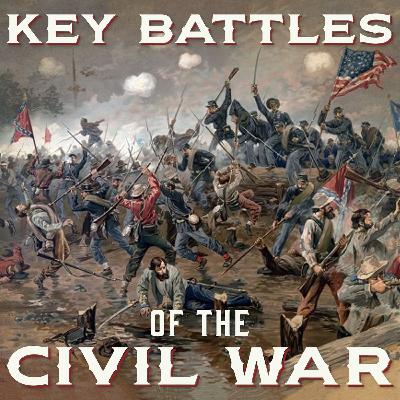

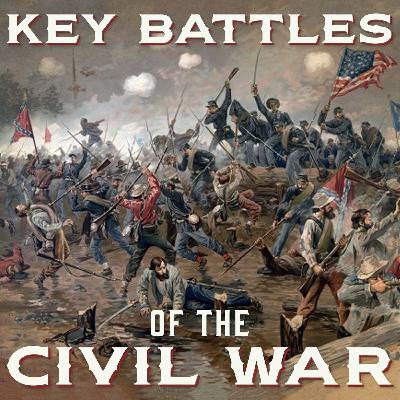
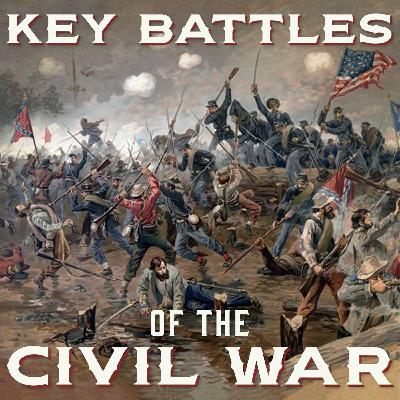




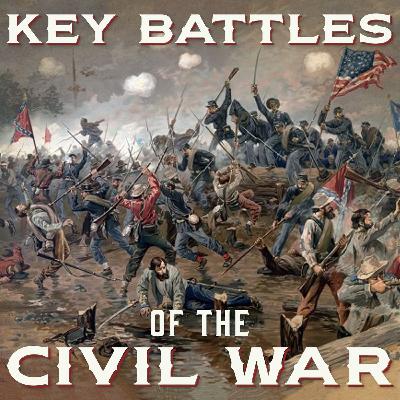
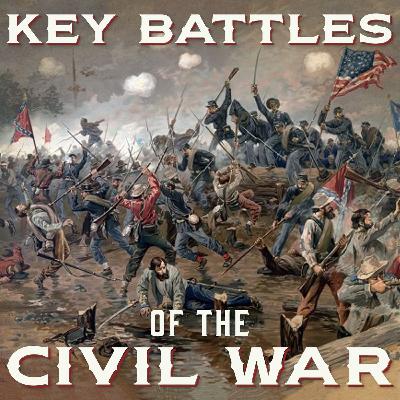

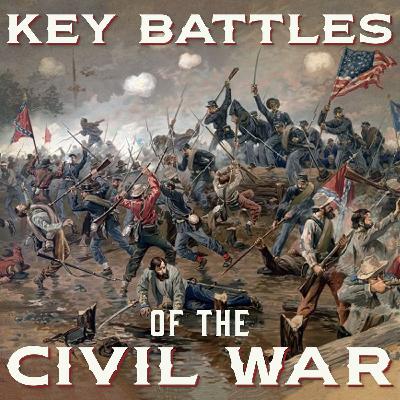
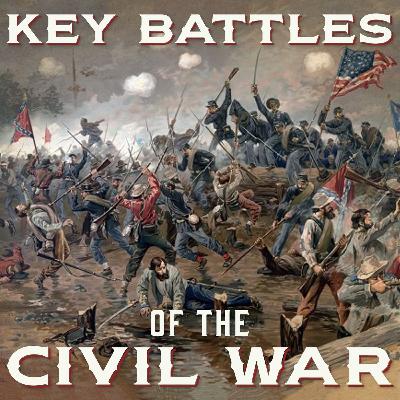
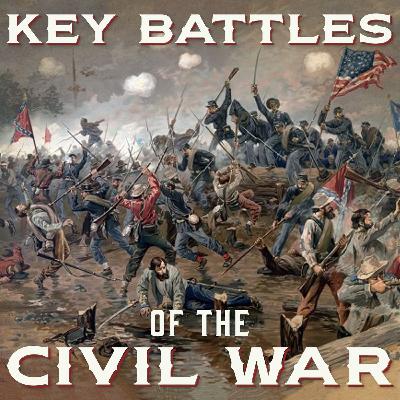


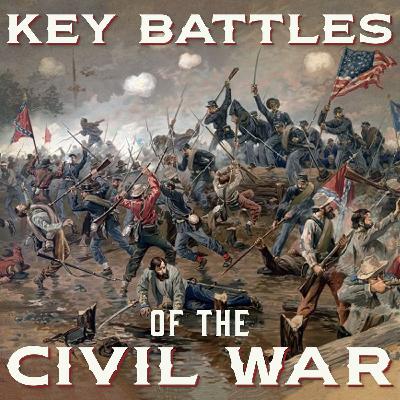

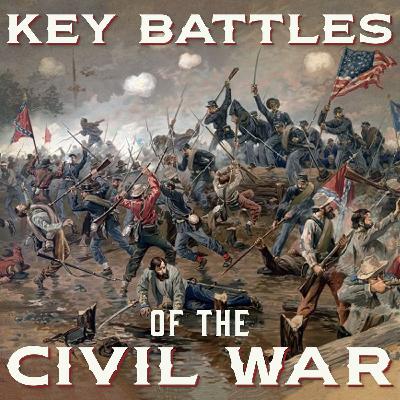
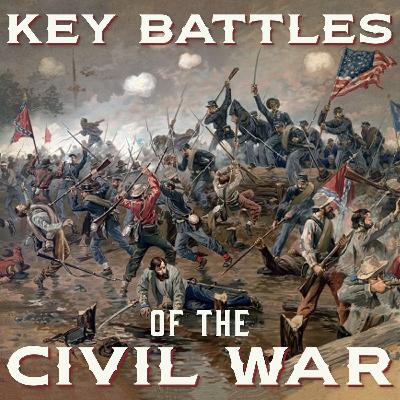



Another awesome episode in the key battles of the civil war podcast.
This is a great series and a great episode. Well done.
l love all the episodes in this series.
so many things wrong with this entire series.